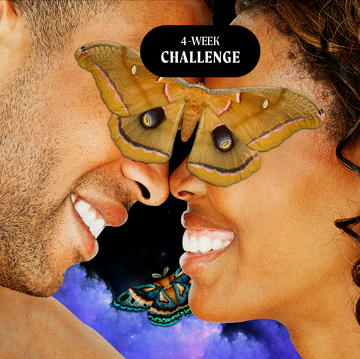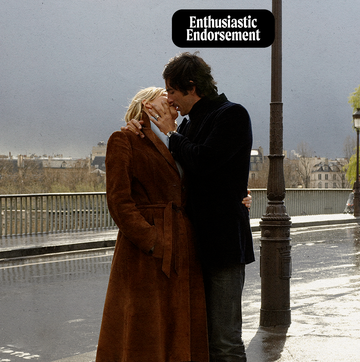Talking about sex on college campuses shouldn't be all that scandalous. They're just big, ivy-coated hotbeds of the so-called "hook up culture," right? But in covering all things sex (from eco-friendly vibrators to penis size) at Cosmopolitan, it's become clear that sex education is under attack at colleges across the country—and students aren't taking it lying down.
In March, the University of Tennessee saw state funding slashed for its first ever Sex Week (which was to include seminars on oral sex and a condom scavenger hunt) after pushback from the state's conservative legislators. Later that month, the University of Pennsylvania declared that no tuition dollars would be used on its Sex Week festivities, forcing student groups to foot the bill for sex ed lectures and workshops. Around the same time, a special sex-themed issue of Central New Mexico Community College's newspaper was banned over its guide to on-campus sex resources and sex toys. Then, in early April, Boston College, a Catholic university, ordered a student-lead sexual health group to stop distributing free condoms—or else.
Not only do those in charge at these colleges not want to talk about sex, they don't want to talk about not talking about sex: When Cosmopolitan.com reached out to the administrations at all of the aforementioned universities, they either ignored or declined requests for comment. Boston College reiterated that its policy on condoms is the same as other Catholic universities.
Still, these institutions haven't succeeded in silencing their undergrads. In every instance of recent debate, students are fighting for their right to sex ed.
"Universities have a stake in ensuring that their students are thinking critically and carefully about sex," says Arielle Pardes, a junior who spearheaded and co-chaired Penn's Sex Week. "We aren't just talking about hooking up. The types of sex conversations that belong in a university setting can range from how we define pleasure to sex trafficking or sexual assault. Just because the topic is sex doesn't mean that it's gratuitous."
The State of Sex Ed
The sentiment behind events like UT's Sex Week wasn't purely bacchanal—like you might expect from a bunch of college kids. The lineup for the festivities included lectures on the concept of virginity, contraception, what it means to be transgender, how to stop sexual violence, and how to talk to your parents about sex—topics that many college students, despite being legal adults age 18 and over—never learned about in high school.
"These students didn't have [real] sex ed. They don't know how to understand their desires and emotions," UT associate professor Lynn Sacco, an adviser and supporter of Sex Week, told Cosmopolitan.com. Many of her students are so clueless about sex by the time they enter college, she says, "they don't even understand basic biology."
Though various studies have found that abstinence-only curriculum in middle school and high school doesn't actually help delay teens from having sex, over 80 percent of high schools in the U.S. continue to rely on abstinence-only education. Data from 2006 to 2008 showed that 93 percent of teens ages 15-to-19 received no formal instruction about STIs, and that over 50 percent had no instruction about using condoms.
Some curricula, supported by the Bush administration and trickling down to the state-level, hardly addressed the benefits of contraception. Though President Barack Obama's PersonalResponsibility Education Program (PREP) gives states federal funding toward "evidence-based" sex ed, several states, including Texas, Arkansas, Kansas and North Carolina, have proposed their own legislation in favor of abstinence ed, as The Week recently reported.
Abstinence-only advocates like Valerie Huber, president and CEO of the National Abstinence Education Association, support this "just say no," prevention approach to sex ed, telling Cosmopolitan.com that abstinence-only programs are "consistent with how other youth risk behaviors such as smoking and drug use are addressed within our public health system."
Without substantive sex ed in high school, students like Jyllian Roach, the editor-in-chief of Central New Mexico Community College's Chronicle newspaper, yearn to engage in meaningful discourse about sex at the collegiate level.
That message seemed lost on her school administration when the Chronicle's special sex issue was hastily pulled from newsstands for being "raunchy." Roach believes that someone in the administration made a purely emotional decision after seeing the cover of the issue, which depicted rumbled sheets with two vibrators peeking out amid strewn condoms.
However, the issue itself, which you can read in full here, wasn't filled with pieces about college hook-ups, but an eager attempt to capture the diversity and reality of human sexuality, from a piece on abstinence to a guide to "safe, sane and consensual" bondage. "Some [sex acts] can cause all sorts of complications and I think a lot of times we make decisions without having all the details," says Roach. "For example, BDSM has become popular because of Fifty Shades of Grey. A lot of people think that portrayal was accurate and it's not...we wanted to give them an idea of what its really like."
After both students and faculty (not to mention a few national news outlets reminding NMCC about freedom of the press) expressed outrage over the pull of the issue, the ban was lifted and the paper was soon redistributed.
But a disconnect between sex-positive student activists and their respective administrations remains, says Pardes, the Penn student who championed its Sex Week.
"Penn and other universities like it so easily put up funding for students to learn just about anything, but when it comes to sex—something that relates to all of our lives—it's suddenly problematic or controversial," she says.
Pushback from universities around sex ed is nothing new, says Sacco, who teaches a course on the history of gender and sexuality at UT, but it nonetheless seems shocking in 2013.
"The idea that, if you talk about sex, it will incite young people is very old," she says. (She referenced a quote from Harvard's former president Charles Eliot, who outlandishly argued in 1913 that "male lust is so powerful of a force, that even Christianity, democracy and humanitarianism can't control it.")
In fact, more students may be controlling thir sexual urges. Virginity rates among college students are rising, but even the more traditional and religious students who aren't having sex still want to understand their desires and crave real knowledge about sex so they're equipped for their future married lives, Sacco said.
"They want reliable facts and a forum where they can discuss their feelings," she said. "To say...in our modern, eroticized society, that sexual pleasure isn't something we should learn about is ridiculous—and the students know it."
Students Leading the Way
Whatever their personal views and choices with respect to sex, this generation of students feels entitled to sexual education and resources—and willing to fight for their rights. "To be treated either like we're not adult enough to provide for ourselves, or in some instance we're animals that can't control our passions, is degrading to the student body," Boston College senior Nathaniel Sanders recently told the New York Times.
Students like Sanders are attempting to bridge the gap between traditional college administrators and a sex-positive generation of late teens and early twentysomethings that is the most liberal to date as far as sexual acceptance is concerned. According to a Pew study in March, 70 percent of people born after 1981 (i.e. the milennials) support same-sex marriage, a number which has grown 19 percent since 2009. Meanwhile, only 38 percent of Baby Boomers are for gay marriage.)
Boston College senior Lizzie Jekanowski, chairwoman of Boston College Students for Sexual Health, the group that was responsible for passing out the condoms in question, continued to do so even after BC ordered her to stop. She continues even now, saying the controversy actually informed unaware students that they could indeed get free condoms on campus. (In addition to providing condoms and comprehensive information about sexual health—since the school doesn't—the group also campaigns for policy reforms, like being able to get STD-testing available on campus.)
In fact, Jekanowski tells Cosmopolitan.com that after speaking with BC's administration in the wake of the media attention surrounding the issue, she's been assured that no disciplinary action will be taken for her condom distribution. What's more, she and her team have been asked to help the school develop a comprehensive, pragmatic (and mandatory) sexual education program for its students—one that will go beyond the traditional Catholic, abstinence-only teachings.
"[The program] is in the very early stages," she says, "but it's the first step."
At UT, Sex Week organizer Brianna Radar gathered private donations to replace the lost state funding, and says more students than she ever imagined turned out for the week's festivities.
"After seeing 400 of my fellow students get together to discuss oral sex, 50 people come to a sexual assault luncheon, and just watching people talk about sexuality, gender, sex, and relationships in such a healthy and open way, I'm beyond gratified," she told Cosmopolitan.com. "I think it truly helped students sort through issues or difficult thoughts." (She also says that students at nearby Tennessee schools have contacted her for advice on how to start their own Sex Weeks.)
Still, more work lies ahead. Though the Obama admiration is dedicating funding to comprehensive approaches to sex ed, Heather Boonstra, Senior Public Policy Associate of the Guttmacher Institute, an organization that works to advance sexual and reproductive health, told Cosmopolitan.com that the current state of sex ed is still a "mixed bag."
The subject of sex in schools remains "ideologically fraught," Boonstra says. A recent Centers for Disease Control study advocates that schools are key in promoting STD and HIV prevention among young people. But even with the best evidence, she notes that some communities continue to break from comprehensive sex ed and make moralistic decisions about what students should learn, and not learn, about sex.
Progress, for now, may lie in the hands of the students.
"I'm not concerned about whether or not Penn 'officially' endorses Sex Week or not, because we learned that there was tremendous support on campus anyway," Pardes says. "I would hope that in the future, institutions of higher education can recognize the intellectual components of sex."
Want more from Natasha? Follow her on Twitter or find her on Facebook.
Photo: Courtesy of Sex Week at the University of Tennessee














